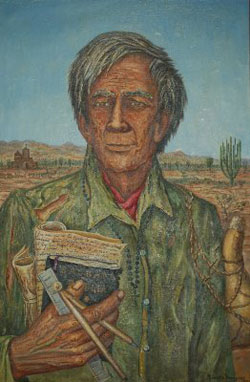
On July 10, 2020, the Pope acknowledged the heroic virtue of the Servant of God Eusebio Francesco Chini (Kino), a priest of the Society of Jesus. Thus, the sainthood cause moves ahead.
Kino, as we know him, was born on 10 August 1645 in Segno, Italy and died in Magdalena, Mexico on 15 March 1711. He was a trained mathematician wanted to imitate the great Saint Francis Xavier. The Jesuit Provincial sent Father Kino to serve as a missionary in what was known as New Spain now Arizona, southern California and Mexico. Kino was called the Horseback priest because his travels covered more than 50,000 square miles on horseback.
At the time of Father Kino’s work the Spaniards forced the native peoples, in particular the Sonoran Indians, to be slaves in the mines. Father Kino was known to oppose the slavery and compulsory hard labor. In today’s atmosphere Kino would be roundly rejected the religious left and secularists. However, Kino contributed to the welfare of others through Catholic Faith, missionary work, education, economy, farming, map making, and constructing.
As a priest he taught others about the truth of Jesus Christ, the need for the Church and her sacraments, and personally baptizing 4,500 people.
His agricultural work draws my attention because it taps into to the care of the person and society. Agriculture also links other things together: faith, reason, science, nutrition, and common sense. Some standards have changed since Kino’s work 400 years ago, but we can see the lines of care and concern for the health of people he interacted with as a missionary. Kino introduced seeds, fruits, herbs, grains, and animal husbandry (beef, sheep, and goats).
Kino now carries the title of Venerable Servant of God. We await a miracle attributed to his intercession. I am looking forward to his beatification someday soon. Father Kino had a generous spirit and a generative character; it is clear to me that his humanity was expansive because of his love of Christ.